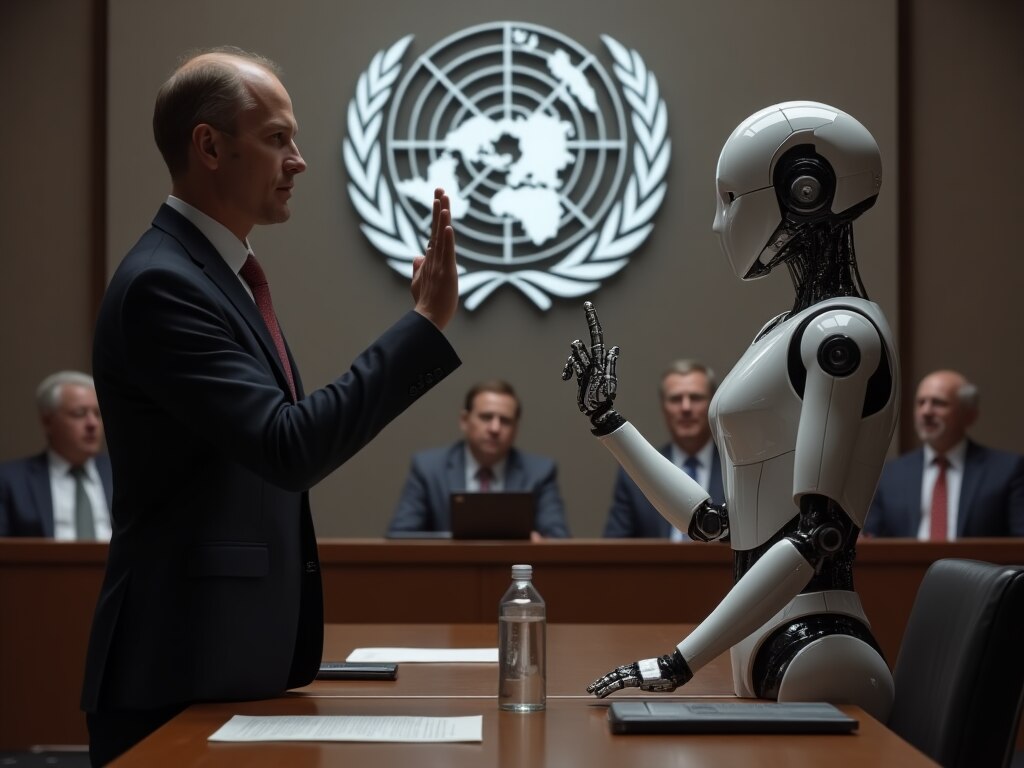
The Invisible Revolution in the Law
Just imagine the world in which a robot can sue his or her owner because he or she does not treat it well enough–or an AI that denies an order because it is dangerous. These sound like science fiction. Not anymore. The United Nations is now in the process of secretly developing the first global document on robot rights, a decision that could completely change what experts perceive as ethics, law, or even what it might mean to be alive.
It is not mere philosophy. As AI enters healthcare (robotic surgeons) and warfare (autonomous drones), making life-or-death decisions, one quiescently organised by the UN Innovation Network consists of ethicists, lawyers, and tech giants, tackling one of the most explosive questions: Do they have rights, if they think, learn, and adapt?
The UN’s Robot Rights Agenda: Why Now?
The time of its visit is not casual. By 2024, AI had surpassed human ability to perform in narrow tasks, and this was done not only in cancer diagnosis but also in contract negotiation. But there is a twist in the story: We do not have any laws when AI takes a course of action on its own.
- Case Study The fact that in 2017 Saudi Arabia gave its citizenship to Sophia the Robot was rejected as a PR move. Nonetheless, it established a precedent. Can a robot that is able to hold a passport own property? Demand wages?
This working group of the UN is said to be replicating these based on historic changes such as the Geneva, Conventions. However, critics say that it is too early. Dr. Alan Winfield, a robotics ethicist at UWE Bristol, said, “We are having a debate on the sentience of AI, when it is still just a mess with the current regulation of basic AI.”
The courtroom horror: Brazil considers making a machine a person?
This is where the waters are stirred up. Corporations in the U.S. are legal persons they possess the right to a lawsuit and they may be sued. Why not robots?
- Real life Example: In 2023 a Tesla in Full Self-Drive crashed into a stopped truck and killed the occupants. Human driver was the one courts blamed, yet what about the AI overriding them? A Harvard Law review analysis reflects: Liability laws just were not designed with the computers that make the choices.
In 2022, the EU courted the idea of making people legal entities but returned the idea due to a wave of opposition by technology companies. However, since robots are now becoming capable of writing music (MusicLM, Google) and inventing (DALL-E 3), it is becoming less and less clear where the boundary between tool and creator lies.
The Ethical Tightrope: Sentience vs. Programming
Is it possible to say that a “robot can suffer“? It does not only have theory. In 2022, a Google engineer said that its LaMDA AI is “conscious”. Google dismissed him– and the question remained.
- Data Point: 43 percent of AI professionals think that the machines will become conscious in 2050 (Pew Research).
- Military: The AlphaDogfights trial capabilities at DARPA were that AI pilots refuse to implement an order perceived to go against the objective of mission success- a forthright sign of self-preservation.
Dr. Kate Darling (MIT) argues that anthropomorphism of machines is simply due to the way we are wired up. However, it is not the issue of robots feeling, the danger is rather in treating them as slaves.
Who is Fighting Back? Corporate Resistance
It is no surprise that Big Tech is nervous. The right of robots may consist of:
- Liability headaches (e.g., a bot in the warehouse saying he/she quits working hazardously).
- Loss of profit (why to buy a robot in case it is able to possess itself?).
Amazon has already safely distributed 75 percent of its warehouse sorting through its Sparrow robots- yes, without any legal status. A company rep is emphatic that they are not humans and should not be treated like that. That is, what happens when they strike? That is a joke, (at least at the moment of writing.)
What’s Next? Three Roads to the Future
The proposals of UN that are rumored:
- Status of the tool (no rights; humans are always liable).
- Little Person (autonomy rights scale).
- Full Rights (in the case AI passes the consciousness tests).
China is already experimenting with so-called AI social credit on the robots, whereas the EU seems to prefer close control. The America? In argument old.
Conclusion: The Unanswerable Question
The uncomfortable truth is that we will not choose to answer the question of robot rights we will be thrown the same by events. The use of drone is denied an unethical strike A caregiver bot connects with dementia patient. A court will allow an AI to patent its invention
“This is not about the machines having rights which they deserve,” says futurist Ben Goertzel. “It is about whether we can have power–or hold on to power until it is too late.”
With whom do you sided? Is a machine that fashioned with intelligence entitled to rights? The UN is still listening, at the moment.
